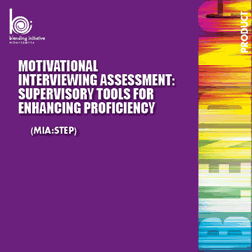Motivational Interviewing Assessment: Supervisory Tools for Enhancing Proficiency (MIA:STEP)

Findings form the National Institute on Drug Abuse's Clinical Trials Network protocol documented that one Motivational Interviewing (MI) assessment interview resulted in higher retention rates during the first four MIA:STEP Brochure Coverweeks of treatment when compared to assessments as usual.The MIA:STEP Blending Team designed empirically supported mentoring products to enhance the MI skills of treatment providers, as well as supervisory tools to fortify a supervisor's ability to provide structured, focused, and effective clinical supervision. MIA:STEP introduces an effective strategy for observation-based clinical supervision, the use of which has potential to improve counselor skills beyond MI
The MIA:STEP training exceeded my expectations. The richness of information presented and valuable practicality made it worth the two days. It really motivated me to help implement the positive changes this training helped me identify.
Buprenorphine Treatment Blending Team Members
NIDA/ NDAT CTN
- Samuel Ball, Ph.D. - Yale University School of Medicine
- John Hamilton, LMFT - LMG Programs Community Treatment Program
- Steven Martino, Ph.D. - Yale University School of Medicine
SAMHSA/CSAT-ATTC
- Steven L. Gallon, Ph.D. - Northwest Frontier ATTC (Chair)
- Sherry Ceperich, Ph.D. - Mid-Atlantic ATTC
- Maria del Mar Garcia, MSW, MHS - Caribbean Basin & Hispanic ATTC
- Denise Pyle, LPC, NCC - Mid-Atlantic ATTC
- Edna Quinones, Ph.D. - Caribbean Basin & Hispanic ATTC

